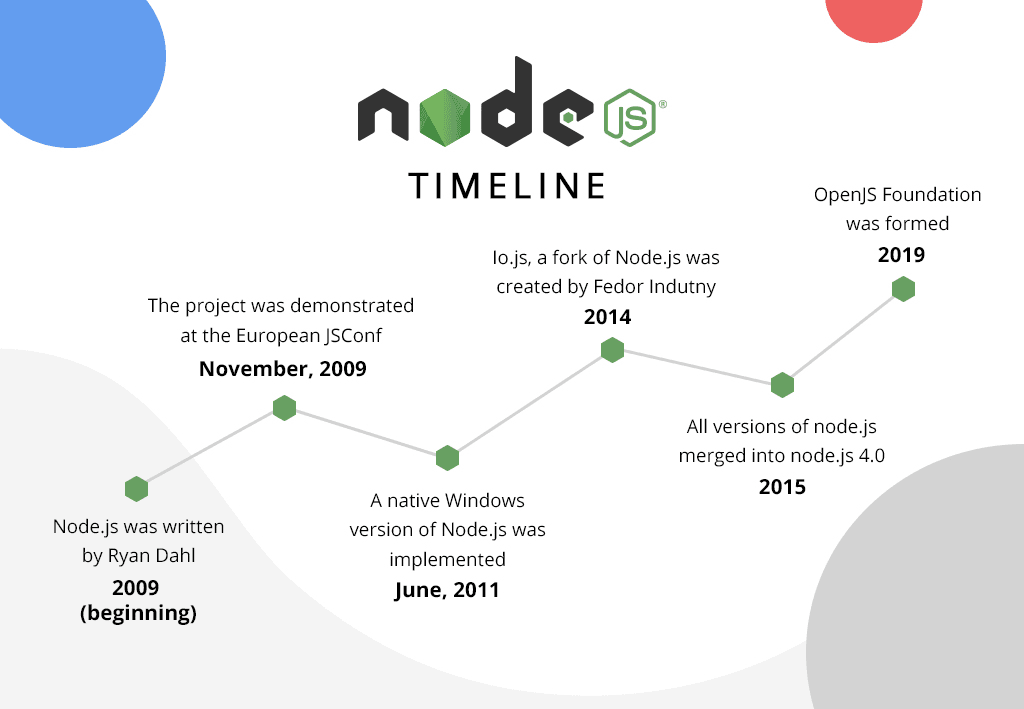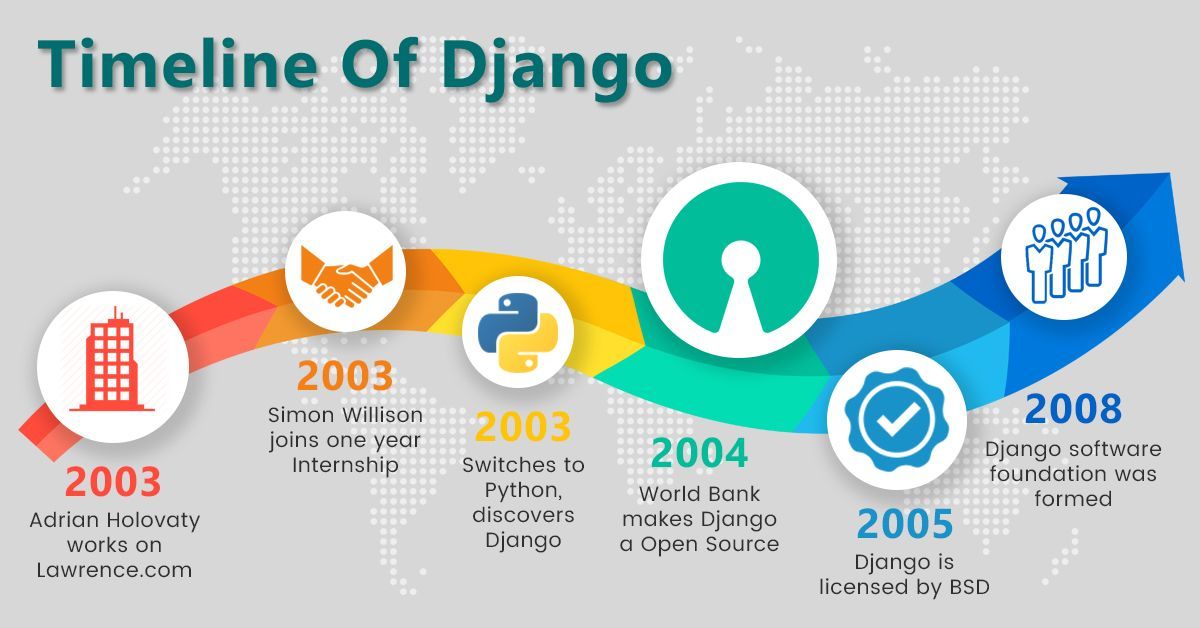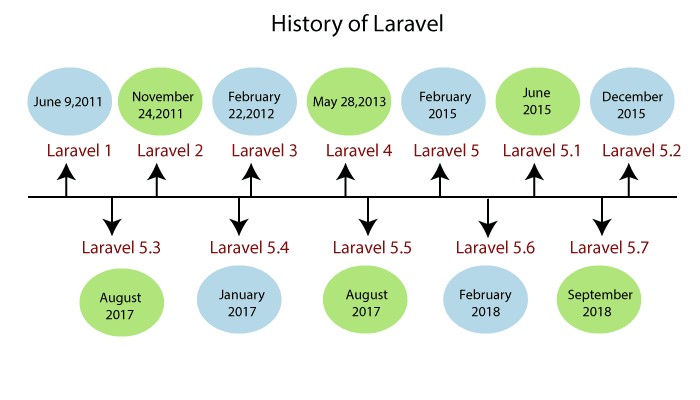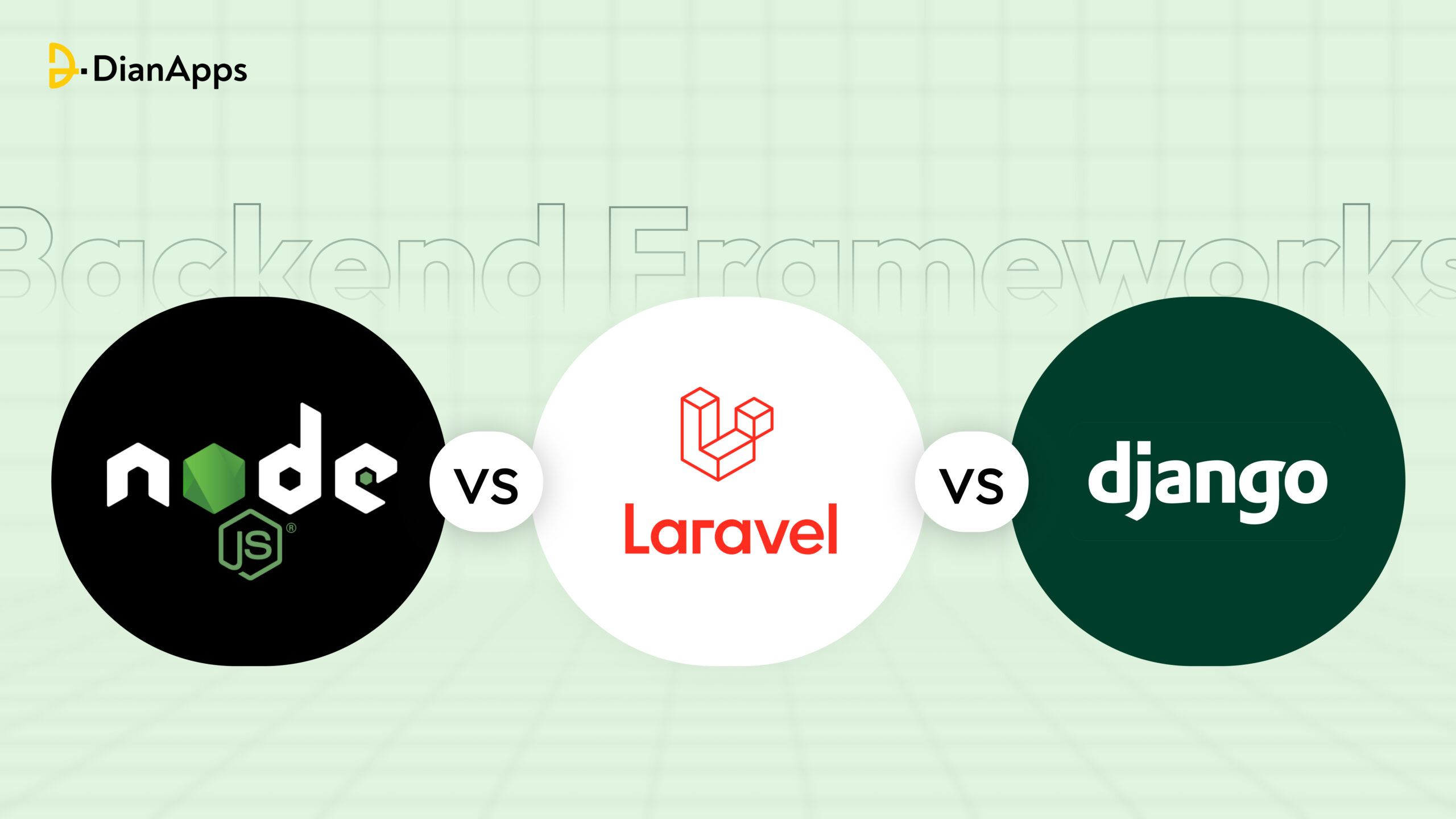Are you a backend developer struggling with large amounts of data? Well, you are not the only one! Many backend developers generally face issues while handling significant volumes of data in the backend web development process.
Since backend development is a huge field with a lot of tools and frameworks that can be integrated to finish the build process. Over 15 years, a myriad of frameworks has been put forward in the market. Among these, the three frameworks that gained significant popularity within the developer community are – Node.js, Django, AND Laravel.
These frameworks for backend development services have played a crucial role in building user-friendly and engaging web applications. However, it can be a concern for many to choose the right framework for your next project.
Whether you need to go for Node.js Django or Laravel? Or maybe you are left debating over these three!
To help you make an informed decision, this blog will provide a detailed comparison of Laravel, Django, and Node.js.
Node.js vs. Django vs. Laravel – Overview
1. Node.js
You might have come across the fact that Node.js is not a framework but a runtime.
Node.js is an open-source, cross-platform environment for performing JavaScript code that runs outside the browser. It utilizes the V8 engine for execution and allows developers to build server-side applications with JavaScript. This is because it runs on a single thread, preventing delays during execution.
The server works by responding to events, so it stays active and ready to handle new requests instead of pausing or sleeping. This efficiency has made Node.js a popular choice among developers. Major companies like Netflix, Uber, and international payment apps like PayPal leverage Node.js for their web applications and services.

Why Should You Use Node.js Backend Framework?
1. Easy scalability
If you hire node.js developers, they can effortlessly scale applications by adding more nodes to the existing system, enabling seamless scalability in both horizontal & vertical directions.
2. High performance
Node.js speeds up and simplifies code implementation by leveraging Google’s V8 JavaScript engine, renowned for directly compiling JavaScript into efficient machine code.
3. Highly extensible
Node.js is highly scalable, allowing developers to customize and extend it according to their specific requirements. Additionally, it facilitates smooth data exchange between clients and web servers using JSON.
4. Extended support
Node.js provides extensive support for a variety of tools that developers find beneficial. For instance, they can utilize Jasmine and other unit-testing tools to test Node.js application source code effectively. Additionally, npm facilitates the identification and installation of project dependencies, streamlining development workflows.
5. Caching advantage
In Node.js, the first module’s requests are automatically cached in the application memory. This feature significantly benefits developers by eliminating the need for code re-execution. Caching enhances application responsiveness, allowing web pages to load quickly and efficiently.
Downsides of Node.js Backend Framework
- A robust native library is not available so JavaScript forces developers to rely on third-party libraries for various tasks.
- Handling relational databases can be complex.
- Node.js’s programming model can be difficult for some developers to understand and manage.
- Callbacks can lead to extensively nested and hard-to-read code structures.
Use Cases of Node.js Backend Framework
You can use the Node.js backend framework for custom software development services when:
- Real-time Apps: Node.js excels in creating real-time applications such as chat messaging platforms.
- Collaborative Software: It’s also ideal for developing collaborative software due to its event-driven architecture.
- Data Streaming: Node.js is well-suited for handling data streaming tasks, supporting both reading and writing data streams efficiently.
- Microservices: It’s commonly used for developing and deploying microservices, taking advantage of its lightweight and scalable nature.
- APIs: Node.js is a great choice for building robust APIs that perform well.
2. Django
Django is a lightweight and programmable web development framework based on Python that follows the Model View Template structure. Launched in 2005, Django quickly became a favorite among developers. Major companies like Pinterest, Instagram, BitBucket, and Mozilla use it for their web applications.

Django’s main strength is its ability to simplify and speed up development by easily integrating solutions, which helps reduce development time and get applications to market faster. Its robust features make it ideal for handling complex projects, solidifying its status as a top choice for developers.
Why use Django Backend Framework?
1. Simple & Fast
Django features a user-friendly learning curve and is specifically designed to accelerate development cycles, effectively fulfilling its purpose.
2. Suitable for any project
Similar to Python’s versatility, Django is well-suited for developing diverse applications, spanning from eLearning platforms to social media networks and robust Big Data management tools.
3. Security
Django provides built-in defenses against SQL injections, cross-site scripting, request forgery, and handles secure user authentication by default.
4. Robust Features
Django streamlines app development by providing a wide array of built-in functions, minimizing the effort required to build applications from the ground up.
Downsides of Django Backend Framework
- Django’s backend framework does not support real-time web applications.
- It relies heavily on its built-in ORM.
- Django’s monolithic architecture, being a single-tiered application, can deter some developers.
- Proficiency in the language is required before implementation.
Use Cases of Django Backend Framework
You can opt for Django Backend Framework when:
- Ideal for creating web applications or backends for APIs.
- Leverage open-source and free software.
- Deploy and modify rapidly for faster development.
- Incorporate cutting-edge technologies like Machine Learning into your software.
- Suitable for working on complex projects.
- Used by companies like Instagram, Firefox, Quora, Facebook, and many more.
You may also like to read: Django Meets Flutter: Integrating the Backend and Frontend for App Development.
3. Laravel
Laravel is a full-stack PHP framework known for its open-source nature and rich feature set, designed for building various web applications. Released later than Django, Laravel offers developers numerous tools that streamline development and reduce time spent coding. It’s favored for projects of all sizes, although proficiency in PHP is essential for effective use. Laravel is particularly popular for content management systems, enhancing websites with features that attract and manage traffic effectively. With robust capabilities throughout the development cycle, Laravel has established itself as a powerhouse for web development needs.

Why Should You Use Laravel Backend Framework?
1. API-based mail sending
Laravel simplifies the implementation of notifications and mailing through built-in API integrations with major mailing services, PHP mail drivers, and support for multi-channel message delivery notifications.
2. Simple data caching
Laravel includes built-in support for memory caching with Redis, Memcached, and other popular caching tools, facilitated by its integrated file cache driver.
3. Convenient log handling
Laravel provides built-in support for multiple log handlers and default exception/error handling.
4. Extensive testing
Laravel supports in-depth unit testing with built-in PHPUnit support and a preconfigured phpunit.xml file. It also includes user simulation features for form input, link clicks, and application requests.
Downsides of Laravel Backend Framework
- It has limited built-in support and may require third-party solutions to address certain issues.
- It can be somewhat sluggish, and developers need to be proficient in PHP to work effectively with Laravel.
- Laravel is still evolving, and its composer is not as advanced as those of some other frameworks.
Use Cases of Laravel Backend Framework
The Laravel framework may be used for the following:
- Stock management, article management, and lite-CRM are among the available features.
- Ideal for running online survey websites.
- Suitable for e-learning apps or interactive websites with high user volumes.
- Companies using Laravel include BBC News, Pfizer, and Crowdcube.
Also read: Positive Development Of The Laravel PHP Framework in the Future.
Node.js vs Django vs Laravel: Comparison based on Parameters
1. Framework Base
Laravel:
Laravel is based on PHP and follows the Model-view-Controller pattern. It is highly praised by developers worldwide for its robust features and performance. Laravel enables rapid development of web applications while handling advanced tasks like routing and authentication seamlessly.
Django:
Django operates on the Model View Template pattern and is based on Python. This framework encourages developers to write code efficiently and effectively.
Node.js:
Node.js is an open-source framework powered by Chrome’s V8 JavaScript Engine, utilizing a non-blocking I/O and event-driven architecture. It aims to empower developers to build efficient web applications.
2. Community
Laravel:
With over 59K stars and 6,247 commits on GitHub, Laravel boasts a strong and active community.
Django:
Django has garnered over 49K stars and 28,289 commits on GitHub, reflecting a robust community of developers.
Node.js:
Node.js leads the pack with more than 69.8K stars and 30,466 commits on GitHub, indicating the largest and most active community among the three.
In the comparison of community support, Node.js wins over both Django and Laravel.
3. Learning Curve
Laravel:
Laravel has a steep learning curve but offers extensive tools like Laracasts and comprehensive documentation. Following these resources will help you gain a strong command of this PHP framework.
Django:
If you have a good grasp of Python syntax, learning Django is straightforward. It’s considered developer-friendly, allowing you to quickly learn and implement it in your projects.
Node.js:
Familiarity with JavaScript makes learning Node.js easier. However, its asynchronous programming model can present coding challenges at times.
4. Scalability and Performance
Laravel:
Laravel may face scalability challenges, particularly when scaling out and managing various application versions. In terms of performance, it may not match up to the capabilities of other frameworks.
Django:
Django is robust for cross-platform applications, providing excellent scalability and handling capabilities. Its architecture supports efficient workflow management for developers.
Node.js:
Node.js excels in scalability and performance, leveraging its asynchronous and non-blocking programming model. This allows developers to efficiently handle multiple events concurrently, enhancing application responsiveness.
5. Rapid Development
Laravel:
Laravel is meant to have a slower development speed compared to other frameworks.
Django:
Django offers a range of plugins that enhance development speed and efficiency, facilitating faster completion of tasks.
Node.js:
Node.js is efficient on various machines, leveraging its lightweight server architecture to handle multiple requests seamlessly, supporting rapid development.
6. Architecture Overview
Laravel:
Laravel follows the MVC (Model-View-Controller) pattern, known for its straightforward and practical syntax. This architecture separates data handling (Model), user interface (View), and application logic (Controller) effectively.
Django:
Django operates on the Model View Template (MVT) pattern, similar to MVC. Here, the Model manages data, the View organizes data presentation, and the Template handles how data is displayed in the user interface.
Node.js:
Node.js utilizes event-driven programming where architecture revolves around user choices, events, and messages from other programs. It excels in handling unsynchronized tasks efficiently.
7. Security Overview
Laravel:
Laravel is recognized for its robust security measures, utilizing hashed password storage and structured processes to mitigate risks such as SQL injections and cross-site scripting.
Django:
Django implements effective security practices to handle complexities and scripting attacks, providing developers with error alerts and ensuring secure appdevelopment.
Node.js:
Node.js offers enhanced security features, but developers may find challenges in complex code structures.
8. Code
Laravel:
|
1 2 3 4 5 6 7 8 9 10 11 12 13 14 15 16 17 18 19 20 21 22 23 24 25 |
< ?PHP /* |-------------------------------------------------------------------------- | Web Routes |-------------------------------------------------------------------------- | | Here, registering of web routes for your application, loaded | by the RouteServiceProvider within a group comprising | ‘web’ middleware group happens. You can start | creating now. */Route::get('/', function () { return view('welcome'); }); |
Django:
|
1 2 3 4 5 |
from django.http import HttpResponse def hello(request): return HttpResponse("Hello world") |
NodeJS:
|
1 2 3 4 5 6 7 8 9 |
var http = require('http'); http.createServer(function (req, res) res.writeHead(200, { 'Content-Type': 'text/plain' }); res.end('Hello World!'); }).listen(8080); |
9. Customizability
Laravel:
Customizing Laravel can be challenging as it often requires integrating external tools for modifications.
Django:
Django lacks effective built-in customization practices, which can lead to difficulties in making extensive modifications.
Node.js:
Node.js provides extensive customization options, leveraging the flexibility and versatility of JavaScript to facilitate robust customization capabilities.
Final Verdict
On a final note, we can end this comparison of Django vs Laravel vs Node.js. Truly speaking, there isn’t any single web app framework that is one-size-fits-all. We’ve compared all three frameworks on the basis of several parameters mentioned above.
In spite of all, the choice of framework totally depends on your client’s requirements, the developer’s expertise, and the future objectives of your business. Hence, you can hire professionals from a top-notch website development company who can serve all the requirements.










Leave a Comment
Your email address will not be published. Required fields are marked *